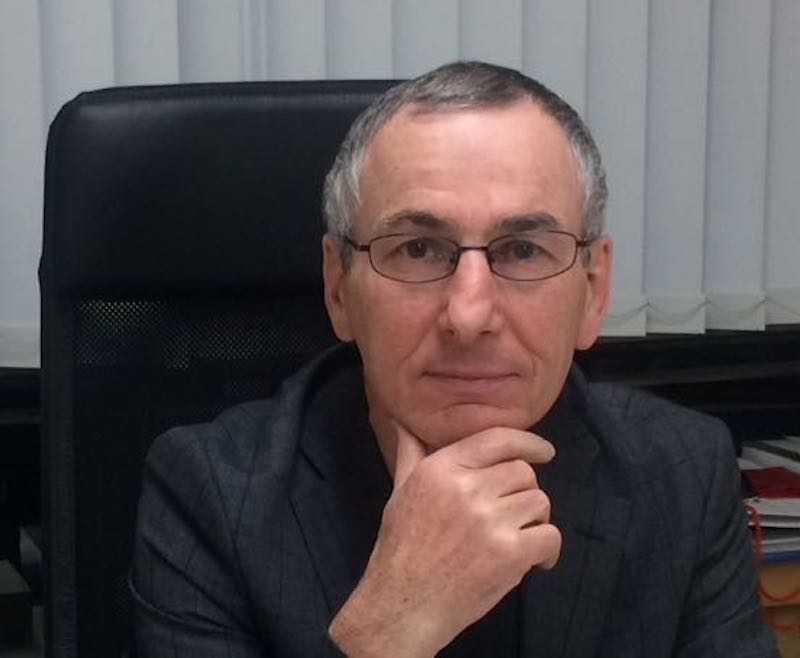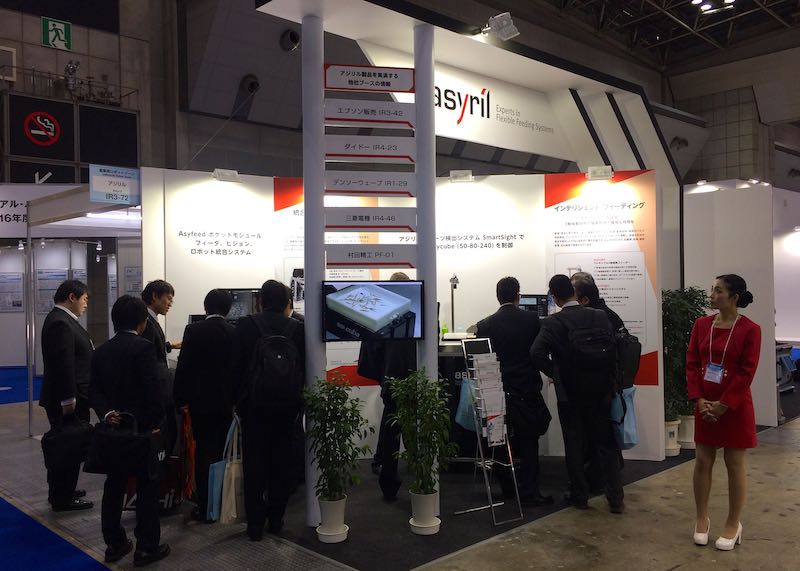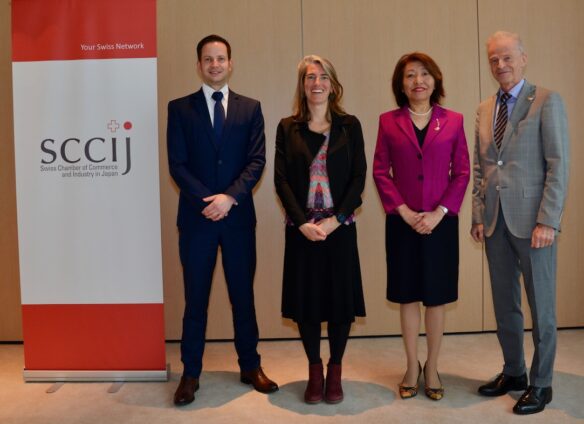Tokyo (SCCIJ) – The boutique business developer Euro-Far East Co. Ltd. has celebrated its 25-year business anniversary in Japan. Founder and owner Robert Champoud from Geneva, Switzerland, has thrived as a market entry provider for many small and medium sized European companies to Japan’s industry. Recently, his focus shifted to bringing Swiss startups to Japan because Japanese companies are looking for outside input to increase their speed of innovation. On the occasion of his business anniversary, SCCIJ talked to Mr. Champoud about his experiences and perspectives. He has been a member of the SCCIJ since he started his business in 1992.
In 2017, you celebrated the 25-year anniversary of your company Euro-Far East in Japan. How do you feel about this achievement?
Robert Champoud: Actually, I was not really aware that I have already been active here in Japan for 25 years. In fact, a couple of months ago, a customer did congratulate me and I reacted like “Wow, already 25 years”! It is a matter of fact that I am now a veteran but I don’t see things that way. The kind of clients, from Europe, who are willing to enter the Japanese market usually in the industrial fields, with niche products, require a lot of adaptability and creativity to find the most suitable business approach for letting the client become successful in Japan. Each time it feels like a fresh start which keeps me going and gives me energy.
Who is one current client you can mention and what do you currently do for him to succeed in Japan?
Robert Champoud: Asyril SA, a ten-year-old Swiss small enterprise from Villaz-St-Pierre (Fribourg), develops and produces very innovative high performance flexible feeding systems for parts and components from 0.1 mm up to 150 mm in size. Our rather deep investigation of the Japanese market, done during the last quarter 2016, showed a real potential for Asyril products in Japan. We decided together to speed up the business development in Japan by participating in iREX, the largest industrial robot exhibition in the world.

Robert Champoud, founder and owner of Euro-Far East Co. Ltd.
What was the result of your participation in the fair?
Robert Champoud: iREX was held a couple of weeks ago in Tokyo and became a major milestone for Asyril. For this, Euro-Far East committed to develop, in less than a year, a first network of distributors while collaborating closely with some key Japanese robot manufacturers. As a result, demo systems of Asyril, besides our own booth, were on display at five other booths including famous robot manufacturers such as Denso Wave, Epson and Mitsubishi. For 2018, I expect Japan sales to already reach a significant level. By 2019/2020, Japan could become a major market for Asyril. This would be the right time to create our own structure dedicated only to business in Japan.
What were the factors you consider relevant for your success during these two and a half decades?
Robert Champoud: To succeed here in Japan, you need to take “full care” of your Japanese customers in a way that goes much beyond the normal understanding Western business people may have about “customer relations”. This has a lot of consequences but, to make it short, your Japanese customer will only be satisfied when all members of the team will get answers to all questions they will ask you. To make it even more difficult, especially for niche products, there is also an understanding in Japan that a product can always be improved, whether this regards the packaging, the quality, the functionality or, simply, the price. All these factors when taken very seriously on every level will lead to a successful outcome.
Please tell us the success story of Euro-Far East during these 25 years which you remember the most and which also explains how you work.
Robert Champoud: Let me first say that Euro-Far East is a small company and we are just doing our best to fulfill our commitments toward our clients from Japan and Europe. So far, we were always able to meet the expectations of all of our clients and their customers with very few exceptions. We are acting totally on behalf of our clients. In the first phase, we will investigate and evaluate the market in order to check out its potential and to eventually define the right business entry. The second phase can be quite different from a client to another one.

Euro-Far East client Asyril at the International Robot Exhibition 2017
Can you give us some examples?
Robert Champoud: For a German software supplier active in the automation market, we focused on a few key accounts and we were, for nearly 15 years, their remote business partner taking care of these key accounts located in Japan but also in Korea and China. For another German supplier of hardware and software, we hired a salesman dedicated to this client. A few years later when the turnover permitted it, we created a fully owned Japanese subsidiary. The salesman became the director of this subsidiary. Today, 12 years after the establishment of this subsidiary, they are a team of six and still managed by the same person.
What brought you to Japan in the first place and why did you decide to set up your own company in Yokohama?
Robert Champoud: Judo brought me here in Japan a very long time ago. After returning to Switzerland and getting engaged with a charming Japanese woman, we decided to give it a try and work a few years in Japan and this is how all started again a little more than 25 years ago! At that time, Tokyo was the right place to be and I found a well-located office in Nogizaka where I stayed up to last year. However, the commuting time started to wear me out. Then I moved to Shin-Yokohama where I now commute by bicycle along a quiet river.
Was it easier to have business success in Japan because you entered Japanese society and culture as a judoka?
Robert Champoud: Probably yes. Two full years living in a dormitory with judo students at Tokai University made me aware of the way Japanese are educated. For example, it was instructive to see the famous judoka Yasuhiro Yamashita, one of the best in the world already during his years as a Tokai University student, being treated the same way as any other judoka of his age and, as a consequence, behaving respectfully to senior judoka. This exemplifies the “senpai-kohai” relation. And, when practicing with world-level judoka, you learn, the hard way sometimes, what the words “isshokenmei ganbarimasu” (一生懸命頑張ります) mean! Yes, I probably experienced mentally and physically an essential part of the Japanese mentality.
Being a Swiss and living so long in Japan, how has the environment of your business changed over the last 25 years?
Robert Champoud: Japan is an exciting country full of surprises and plenty of contradictions. However, the Japanese have this incredible ability to adapt and even reinvent themselves. There is a lot of talk about the lost decade but in the 21st century the country has changed enormously. Uniqlo, Rakuten, Softbank are new giants which did not exist in the 1990s. Also, moving around in Japan is so convenient. But, and this is a matter of fact, the way business is done has not changed that much. “Nemawashi” (informal decision process in a company) is still the way to handle a new project and it is up to us Westerners to accept it or … to move to another country!
Looking to the future, where do you see the Japanese economy heading in the next years into the 2020s?
Robert Champoud: I like very much what is happening these days. The economic situation looks quite stable and in general a lot of companies have capital to invest. Being active in the industrial market, the key words are “IIoT (Industrial Internet of Things)”, “Industry 4.0”, “Machine Learning (& AI)”, “Big Data” etc. If we add the aging factor and the fact that the Japanese population has started to decrease, you can only see business opportunities.
The industrial market where you operate is changing rapidly. Where do you see the challenges?
Robert Champoud: Indeed, the fourth industrial revolution with the convergence of multiple digital technologies is just revolutionizing our daily life at a speed never experienced before. Now, all big companies are looking for the next disruptive technology, innovation and product. However, it is not an easy task for established companies and their R&D department to think outside of the box. This is especially true for Japanese companies. It is a problem of resources, of time restriction and market constraints.
What is your idea of a solution of this innovation dilemma?
Robert Champoud: I think this is the perfect entry point for startups. Here again, the Japanese eco and education system do not favor the creation of startups. But Switzerland’s success and reputation are based on startups and innovations coming from our educational system (EPFL, ETHZ and other Applied Science universities). Thus, a major focus at Euro-Far East for the past 12 to 15 months has been the promotion of a few Swiss startups in Japan. We were already able to build a few bridges between three startups and Japanese big companies. One of them is Biowatch who has developed a wrist veins biometric reader. Another develops AI software emotion recognition solutions. This feels like a perfect start for my next 25 years in Japan.
Interview: Martin Fritz for SCCIJ; Photos: Euro-Far East Co. Ltd.





























